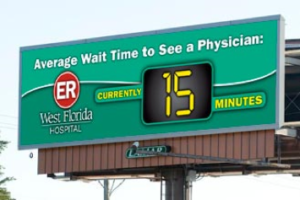Hospital executive are being forced to think outside the box to keep their facility relevant within their community in the midst of a federal government and consumer led tsunami. Retailers and big box stores are aggressively moving into the delivery of primary care by providing millions of Americans with convenient locations and extended hours of operation. Need a flu shot? Check. Need a pregnancy test? Check. Need a sports physical? Check. Wonder who these folks are? Well they are CVS, Kroger, Target, Walgreens, Wal-Mart and others.
Here is a list of some of the strategies that hospitals are incorporating to increase their local community awareness, drive market share and remain competitive in today’s evolving marketplace. If you want to get to the C-Suite help them in one of these areas!
- Direct contracting with large employers: Hospitals like Cleveland Clinic in Cleveland, Ohio; Mercy in St. Louis, Missouri and St. Francis Health Alliance in Charleston, SC. all have one thing in common. They are contracting directly with large employers to provide either a specific service i.e. hip replacements under a fixed fee agreement or primary care for workers. This is an untapped market for hospitals/systems since only about 2% of the 130 large U.S. employers use a direct contract for worker’s benefits.
- Posting ED Wait Times: If you have ever had to go to a hospital emergency department
 (ED), you know that you may be required to wait awhile before a doctor or other medical professional sees you. This of course varies by the patient’s condition. Individuals who are suspected of having a heart attack or those who are suffering a life-threatening situation are typically seen by doctors as soon as they arrive at the hospital. For less urgent cases, such as for X-rays, minor cuts and scrapes patients can wait for hours before seeing a doctor. In attempt to be more customer centric many hospitals are now posting their ED wait times on their websites, on billboards or on smartphone apps. For people with conditions that are not life-threatening, this information allows them to postpone going to the ED or go to a different hospital.
(ED), you know that you may be required to wait awhile before a doctor or other medical professional sees you. This of course varies by the patient’s condition. Individuals who are suspected of having a heart attack or those who are suffering a life-threatening situation are typically seen by doctors as soon as they arrive at the hospital. For less urgent cases, such as for X-rays, minor cuts and scrapes patients can wait for hours before seeing a doctor. In attempt to be more customer centric many hospitals are now posting their ED wait times on their websites, on billboards or on smartphone apps. For people with conditions that are not life-threatening, this information allows them to postpone going to the ED or go to a different hospital.
CMS has established a standard definition with which to accurately compare different hospitals. The agency defines “waiting time” as the time from when a patient walks in the door to when he is evaluated by a licensed provider (a doctor, physician assistant or nurse practitioner).
- Outsourcing Reversal: For years’ hospitals have been outsourcing all types of services such as dietary, housekeeping, dialysis and physician services for the ED, anesthesia and neonatology to name a few. On January 11, 2016 Advocate Health Care agreed to manage 56 metropolitan area Walgreens clinics. Key is that these clinics will be owned by Advocate Health and they will be branded as Advocate Clinic at Walgreens. These clinics will be staffed by board certified nurse practitioners and they will offer same day appointment scheduling. This will provide consumers in the catchment area with convenience and access to care while strengthening care coordination.
- Spine Surgery Refund: How is this for innovative thinking? If you go to Geisinger
 Medical Center in Danville, PA for lumbar spine or bariatric surgery and you are not satisfied you can receive your co-pay, as a refund up to $1,000. It’s called their Proven Experience Program and its designed to make it easy for patients to provide feedback on their care so that Geisinger can improve and offer the best service experience in any industry not just healthcare. This is a laudable goal. Offering to pay patients this small amount is not much of a financial risk for Geisinger but from a marketing point of view it’s a home run. The question is will other hospitals follow this strategy and will Geisinger offer it with other types of surgical procedures?
Medical Center in Danville, PA for lumbar spine or bariatric surgery and you are not satisfied you can receive your co-pay, as a refund up to $1,000. It’s called their Proven Experience Program and its designed to make it easy for patients to provide feedback on their care so that Geisinger can improve and offer the best service experience in any industry not just healthcare. This is a laudable goal. Offering to pay patients this small amount is not much of a financial risk for Geisinger but from a marketing point of view it’s a home run. The question is will other hospitals follow this strategy and will Geisinger offer it with other types of surgical procedures?
- Clinics within Target in Partnership with Kaiser Permanente: If you live in San Diego, require healthcare and shop at Target, you can receive primary care services through a partnership that the retailer has with Kaiser Permanente. Traditionally Target’s in store clinics have focused mainly on vaccinations, treatment of acute illnesses and biometric screenings which is convenient care. This new relationship in several of their stores allows them to expand their offerings to include pediatric and adolescent care, obstetrics/gynecology care, chronic care management and other services. These clinics are staffed by both nurse practitioners and physician assistants who are linked to Kaiser Permanente physicians via telehealth technology. In addition, they have access to the Kaiser Permanente clinical infrastructure, including electronic health records and lab services.
- Clinics in Grocery Stores & Pairing Docs with Grocery Shoppers: Hospitals and
 healthcare systems have begun to develop business relationships with supermarket chains. In response to growing rates of obesity and diabetes in Orange County-CA, which is the demographic market for St. Joseph Hoag Health, the eight hospital group created a “Shop with Your Doc” experience with Ralphs and Food 4 Less. In this program St. Joseph physicians, dieticians, nutritionists and weight management coordinators were onsite to assist shoppers with making healthy food choices. They did six events from 10 AM – 4 PM. They brought health education and awareness directly to their community in novel and practical manner.
healthcare systems have begun to develop business relationships with supermarket chains. In response to growing rates of obesity and diabetes in Orange County-CA, which is the demographic market for St. Joseph Hoag Health, the eight hospital group created a “Shop with Your Doc” experience with Ralphs and Food 4 Less. In this program St. Joseph physicians, dieticians, nutritionists and weight management coordinators were onsite to assist shoppers with making healthy food choices. They did six events from 10 AM – 4 PM. They brought health education and awareness directly to their community in novel and practical manner.
- Marin General Hospital (MGH) & Philips: Through this strategic partnership, Philips will provide MGH with a comprehensive range of advanced medical technologies including imaging systems, patient monitoring, telehealth and clinical informatics solutions along with clinical education, consulting and design services. The contract is for 15 years and $90M. This partnership will allow MGH to create long-term patient value while managing costs, complexity, and risk. In the initial phase of a similar, long-term partnership with Philips, another hospital reported a 35 percent reduction in technology spending, while improving clinical quality. For Philips it allows them to remove competition for the life of the contract and it provides them with a predictable revenue stream. A win-win relationship for both organizations.
Parting Thoughts
Hospitals must continue to innovate because as of 1/1/15 there were 1,856 retail clinics located within CVS (Minute Clinic), Walgreens, Kroger (The Little Clinic), Wal-Mart, Target and others. If you want the attention of the C-Suite help them innovate in a way that helps them increase revenue, reduce costs or mitigate risks.
As always we welcome your thoughts and input. Let’s start a discussion and elevate the sales profession with a thoughtful, civil and informative discourse.


